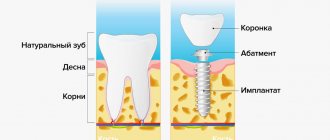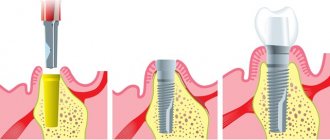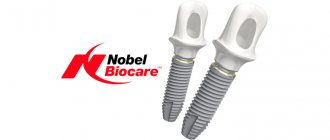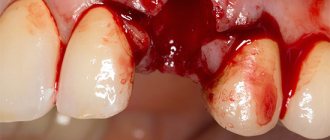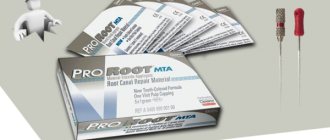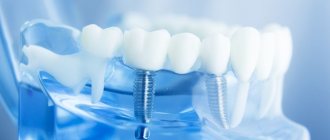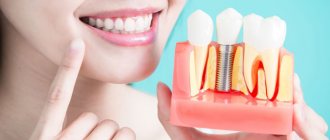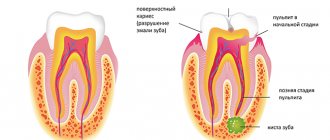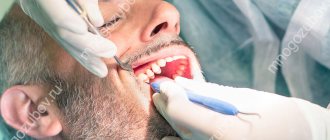Indications for implant removal
- Rejection of the structure mainly develops within six months after implantation.
- Peri-implantitis or perimucositis - the first is accompanied by a loss of jaw bone against the background of inflammation of the soft tissues, the second occurs without loss of tissue volume.
- Excessive load on the implant - occurs due to violation of the installation protocol.
- Incorrect position or defective implant is extremely rare.
- End of service life - for models with limited serviceability.
In our clinic, implant installation is carried out strictly in accordance with surgical protocols, using the most reliable systems in the world, Nobel Biocare (USA), with a lifetime warranty from the manufacturer and almost zero risk of rejection. If an unpleasant situation does arise, we guarantee free dismantling of the structure.
Problems after implantation
After unsuccessful installation of implants, diseases such as mucositis and peri-implantitis may develop. They are characterized by periodontal inflammation in the area of the implants. These diseases are similar in symptoms to periodontitis and gingivitis, but differ in the nature of their course.
Mucositis manifests itself as inflammation of the mucous membranes in the area of the implant, while there are no signs of bone loss. With peri-implantitis, an inflammatory process occurs in the soft tissues also in the area of the implant, but it is accompanied by bone resorption. Diagnosis is made using probing of the gum pockets and x-rays. Mucositis is a less serious disease, its treatment is faster and easier, including cleaning the gum pockets and treating them with antiseptics.
Peri-implantitis is a more complex disease that develops against the background of poor implant healing. Inflammation starting in the oral cortex can lead to bone loss. It occurs in several stages:
- in a mild case of the disease, a loss of bone tissue around the implant occurs in a volume of 1-3 mm, a slight inflammatory process is observed on the surface of the mucous membranes, which can cause minor pain;
- with moderate severity, about 50% of the bone tissue is lost along the implant, pus discharge and an unpleasant odor appear;
- At the last stage of peri-implantitis, almost complete bone resorption occurs, which leads to the formation of deep pockets that are filled with soft tissue, against the background of which infections develop, pus accumulates, and bleeding occurs.
The first stage of peri-implantitis responds well to treatment. The patient is prescribed products with a disinfectant and analgesic effect. At the second stage of the disease development, complex treatment is required, and at the last stage, most often, re-installation of implants.
How are dental implants removed?
After the doctor, based on X-ray data, decides to remove the dental implant, a planned operation is scheduled. Removal of dental implants occurs in this way:
- Anesthesia is performed.
- The temporary or permanent crown is removed.
- The gum is incised to provide access to the artificial root.
- The implant is removed.
- Sutures are placed (if re-implantation is planned, bone material is added before suturing).
Expert opinion
Igor Yurievich Malinovsky
Maxillofacial surgeon, implantologist
Experience: more than 11 years
Dental implant failure is a very rare occurrence. Provided that the implantation is carried out with high quality and the implants are correctly selected, everything ends successfully, and the patient uses new teeth for the rest of his life. If, due to violations of rehabilitation rules, accidental injury or other reasons, the implant is rejected, do not despair. In most cases, it is possible to install a new artificial root of larger diameter in its place after eliminating the pathological process.
Dental implant removal cost
The cost of removing a titanium rod is equivalent to removing a complex tooth. However, a number of factors are taken into account that can increase the final amount. This is bone grafting, plastic surgery of soft gum tissue. Additional procedures are paid separately.
If the implantation was carried out in a clinic and the removal is performed in the same clinic, the procedure is free under warranty . If the patient came from another clinic, he needs to pay for the service. The price will depend on the clinical picture.
What the patient should know
Every person who is going to undergo a dental implant procedure must have the following information:
- implantation is a commercial service and is not included in the list of “Compulsory health insurance”;
- a denture that is broken for no reason by the patient can be replaced free of charge with a new one only in the clinic where it was placed;
- the cost of treating complications is much higher than the cost of implantation , so it is necessary to strictly adhere to the specialist’s prescriptions.
An important point is the selection of the clinic. Well-established dental centers provide a long-term guarantee on their work and are responsible for its quality.
Why does the implant not take root?
Physiological rejection
Occurs as a result of the patient’s body’s rejection of implants for the following reasons:
- allergic reaction to components of the dental system material;
- weakened immune system;
- chronic diseases in the acute stage;
- trauma to the jaw bone at the site of rod insertion;
- installation of an implant without taking into account the individual characteristics of the patient’s dental apparatus.
Doctor's mistakes
In clinics that value their reputation, such situations rarely happen:
- unsatisfactory diagnosis and sanitation of the oral cavity at the preparatory stage for implantation;
- neglect of the osteoplasty procedure for bone tissue atrophy;
- incorrect selection of the implant model, location in the jaw, unreliable fixation;
- violation of sterility;
- premature load on the structure, unacceptable in a particular situation;
- use of rods of questionable quality.
Patient errors
We make sure to give recommendations to the patient after implantation. If he was irresponsible in their implementation, the implant may be rejected due to:
- getting infections into the mouth through unwashed hands;
- non-compliance with the rules of daily oral hygiene;
- failure to follow postoperative recommendations for taking antibiotics and other drugs;
- smoking, drinking alcohol immediately after implantation of a titanium rod;
- increased physical activity;
- thermal procedures (bath, sauna, hot bath, overheating under the sun);
- hypothermia;
- neglect of doctor visits for examinations and preventive office procedures.
Questions and answers
3 years ago I had implants placed on my lower jaw and the remaining teeth were removed.
And in March, all the implants were removed. The result is changes in bone tissue and flat gums. Is it possible to install a flexible prosthesis there? I have a removable denture on top. 3 years ago I had implants placed on my lower jaw with the removal of the remaining teeth. And in March, all the implants were removed. The result is changes in bone tissue and flat gums. Is it possible to install a flexible prosthesis there? On top of my head there is a removable denture
Hello! Prosthetics with soft dentures in such cases is possible, but a preliminary examination of the oral cavity is necessary. Come visit us for a free consultation. Based on the results of the examination, our orthopedists will offer you the best options for dental prosthetics in your case. You can make an appointment by calling + 7 (495) 789-42-02. Sincerely, Patient Support Center SIMPLADENT++8 800 333-53-41
I would like to know how safe it is to carry out implantation and prosthetics at once and whether installing a prosthesis will harm the healing of the implants?
Good afternoon. I have four teeth in a row on my upper jaw on the left side that need to be removed, including two front incisors. The doctor recommends immediate implantation and prosthetics. I would like to know how safe it is and whether installing a prosthesis will harm the healing of the implants. Of course, you don’t want to walk around with a hole in your mouth, but you also don’t want to make things worse.
Hello. Modern implantation systems used in implantation protocols with the possibility of immediate dentures are equipped with special aggressive threads. Implants are screwed into the bone, providing maximum tissue compression. That is, the bone becomes stronger and firmly holds the artificial root in the hole.
The adaptation prosthesis, which is installed on implanted implants, has a metal base that works on the principle of a beam - the implants and prosthesis are a single system, which ensures high primary stability and immobility in the jaw bone. Artificial teeth fixed on a metal beam are made of metal-plastic.
This is a lightweight material that is strong enough to fully participate in the chewing process, but does not overload the implants. Only with this material is it possible to correct the bite at the time of engraftment of the implants. The prosthesis is permanently fixed and should be worn until the osseointegration process is completed - on average this takes about 6-12 months. It is then replaced with a permanent structure made from more durable and aesthetic materials. More detailed information can be obtained at a free consultation with a specialist in one of our clinics.
SIMPLADENT specialists will answer all questions by phone: + 800 333-53-41 Other questions
Rejection symptoms
- Bleeding, redness of the gums;
- swelling;
- pain;
- increased body temperature;
- mobility of the artificial root;
- detachment of soft gum tissue by more than 1 mm;
- headache;
- difficulty chewing food;
- bad breath;
- weakness;
- the appearance of fistula tracts in the subgingival part;
- violation of the symmetry of the oval of the face.
Bleeding, swelling of the gums, pain and fever are normal in the first week after implantation. If they persist and other unpleasant signs are added, you should urgently consult the doctor who performed the operation.
Clinical cases
Let us give examples from life regarding the unsuccessful completion of osseointegration, which resulted in the removal of the implant.
- After chemotherapy, a man had a titanium structure installed on the area of his jaw that had a malignant formation. The patient did not inform the doctor about the presence of a serious pathology, and the doctor did not notice bone changes in the operated area. Naturally, engraftment did not take place due to a decrease in the regenerative function of the bone. After the removal of the rod, six months passed before reimplantation became possible. During this time, the implantologist and oncologist actively took measures to solve the problem.
- The patient was treated by an orthodontist. She was fitted with braces and offered to have one tooth implanted. Since there was not enough space for it, bone augmentation was performed. After integration of the artificial root, it was rejected due to compression by neighboring teeth, as a result of which it was removed.
How to avoid complications
It is possible to prevent the removal of a dental implant. Negative consequences are minimized when:
- a responsible approach to the issue of choosing a clinic - it is important to find out about certification for the right to conduct such operations, the qualifications of doctors, and familiarize yourself with the terms of the contract;
- maintaining sterility and hygiene during the rehabilitation period after implantation;
- quitting smoking and alcohol in the first 7-10 days;
- minimizing physical activity;
- excluding solid foods and hot foods from the diet;
- refusal of thermal procedures;
- Regular visits to the clinic in accordance with the drawn up treatment plan.
Implantation is a serious surgical procedure, and during the recovery phase it is important to follow recommendations regarding nutrition, hygiene, and medication.
Prevention of negative consequences
Both the doctor and the patient can prevent complications from occurring.
The specialist must:
- prepare the oral cavity for surgery;
- diagnose diseases included in the list of contraindications;
- perform plastic surgery of the jawbone, if required;
- follow the surgical protocol for the procedure;
- ensure complete sterility;
- issue recommendations for the rehabilitation period.
The patient must:
- inform the doctor about existing serious illnesses;
- undergo the necessary examination;
- carry out assignments;
- ensure quality oral hygiene.
How long does it take for a wound to heal?
After surgery, the wound remains sensitive for 1-3 days. She needs special care for the next 2-3 weeks:
- upon returning home, apply ice or a cold compress to the intervention area;
- During the first hours you should not lie down, otherwise swelling may occur; it is better to sit or take a walk;
- You can only drink water at room temperature;
- Before the stitches are removed, you cannot eat flour, sticky foods, sweets, yoghurts; light soups, purees, and soft cutlets are allowed;
- in the first days, strong tea, coffee, and highly carbonated drinks are prohibited;
- You can chew only with the healthy side, rinse your mouth with warm water after each meal;
- one day after the operation, you can brush the adjacent teeth with a soft brush, but not with an electric brush or an irrigator.
Make an appointment with an implantologist
The doctor’s opinion is that the operation itself is completely painless
Before installing a dental implant, patients often worry about the procedure and how they feel in the dentist’s chair. But there is no discomfort at all; the patient can only feel slight pressure or vibration. If we compare the procedure with tooth extraction, the latter feels much more unpleasant. For anxious patients, you can take a course of premedication before surgery.
Levin Dmitry Valerievich
Chief physician, Ph.D.
